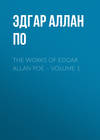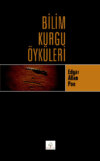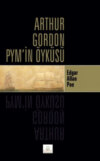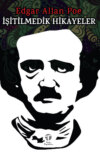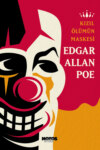Kitabı oku: «The Works of Edgar Allan Poe – Volume 1», sayfa 6
He was mistaken – undoubtedly – mistaken.
Fourthly, That Hans Pfaall himself, the drunken villain, and the three very idle gentlemen styled his creditors, were all seen, no longer than two or three days ago, in a tippling house in the suburbs, having just returned, with money in their pockets, from a trip beyond the sea.
Don’t believe it – don’t believe a word of it.
Lastly. That it is an opinion very generally received, or which ought to be generally received, that the College of Astronomers in the city of Rotterdam, as well as other colleges in all other parts of the world, – not to mention colleges and astronomers in general, – are, to say the least of the matter, not a whit better, nor greater, nor wiser than they ought to be.
~~~ End of Text ~~~
Notes to Hans Pfaal
(*1) NOTE – Strictly speaking, there is but little similarity between the above sketchy trifle and the celebrated “Moon-Story” of Mr. Locke; but as both have the character of hoaxes (although the one is in a tone of banter, the other of downright earnest), and as both hoaxes are on the same subject, the moon – moreover, as both attempt to give plausibility by scientific detail – the author of “Hans Pfaall” thinks it necessary to say, in self-defence, that his own jeu d’esprit was published in the “Southern Literary Messenger” about three weeks before the commencement of Mr. L’s in the “New York Sun.” Fancying a likeness which, perhaps, does not exist, some of the New York papers copied “Hans Pfaall,” and collated it with the “Moon-Hoax,” by way of detecting the writer of the one in the writer of the other.
As many more persons were actually gulled by the “Moon-Hoax” than would be willing to acknowledge the fact, it may here afford some little amusement to show why no one should have been deceived-to point out those particulars of the story which should have been sufficient to establish its real character. Indeed, however rich the imagination displayed in this ingenious fiction, it wanted much of the force which might have been given it by a more scrupulous attention to facts and to general analogy. That the public were misled, even for an instant, merely proves the gross ignorance which is so generally prevalent upon subjects of an astronomical nature.
The moon’s distance from the earth is, in round numbers, 240,000 miles. If we desire to ascertain how near, apparently, a lens would bring the satellite (or any distant object), we, of course, have but to divide the distance by the magnifying or, more strictly, by the space-penetrating power of the glass. Mr. L. makes his lens have a power of 42,000 times. By this divide 240,000 (the moon’s real distance), and we have five miles and five sevenths, as the apparent distance. No animal at all could be seen so far; much less the minute points particularized in the story. Mr. L. speaks about Sir John Herschel’s perceiving flowers (the Papaver rheas, etc.), and even detecting the color and the shape of the eyes of small birds. Shortly before, too, he has himself observed that the lens would not render perceptible objects of less than eighteen inches in diameter; but even this, as I have said, is giving the glass by far too great power. It may be observed, in passing, that this prodigious glass is said to have been molded at the glasshouse of Messrs. Hartley and Grant, in Dumbarton; but Messrs. H. and G.‘s establishment had ceased operations for many years previous to the publication of the hoax.
On page 13, pamphlet edition, speaking of “a hairy veil” over the eyes of a species of bison, the author says: “It immediately occurred to the acute mind of Dr. Herschel that this was a providential contrivance to protect the eyes of the animal from the great extremes of light and darkness to which all the inhabitants of our side of the moon are periodically subjected.” But this cannot be thought a very “acute” observation of the Doctor’s. The inhabitants of our side of the moon have, evidently, no darkness at all, so there can be nothing of the “extremes” mentioned. In the absence of the sun they have a light from the earth equal to that of thirteen full unclouded moons.
The topography throughout, even when professing to accord with Blunt’s Lunar Chart, is entirely at variance with that or any other lunar chart, and even grossly at variance with itself. The points of the compass, too, are in inextricable confusion; the writer appearing to be ignorant that, on a lunar map, these are not in accordance with terrestrial points; the east being to the left, etc.
Deceived, perhaps, by the vague titles, Mare Nubium, Mare Tranquillitatis, Mare Faecunditatis, etc., given to the dark spots by former astronomers, Mr. L. has entered into details regarding oceans and other large bodies of water in the moon; whereas there is no astronomical point more positively ascertained than that no such bodies exist there. In examining the boundary between light and darkness (in the crescent or gibbous moon) where this boundary crosses any of the dark places, the line of division is found to be rough and jagged; but, were these dark places liquid, it would evidently be even.
The description of the wings of the man-bat, on page 21, is but a literal copy of Peter Wilkins’ account of the wings of his flying islanders. This simple fact should have induced suspicion, at least, it might be thought.
On page 23, we have the following: “What a prodigious influence must our thirteen times larger globe have exercised upon this satellite when an embryo in the womb of time, the passive subject of chemical affinity!” This is very fine; but it should be observed that no astronomer would have made such remark, especially to any journal of Science; for the earth, in the sense intended, is not only thirteen, but forty-nine times larger than the moon. A similar objection applies to the whole of the concluding pages, where, by way of introduction to some discoveries in Saturn, the philosophical correspondent enters into a minute schoolboy account of that planet – this to the “Edinburgh journal of Science!”
But there is one point, in particular, which should have betrayed the fiction. Let us imagine the power actually possessed of seeing animals upon the moon’s surface – what would first arrest the attention of an observer from the earth? Certainly neither their shape, size, nor any other such peculiarity, so soon as their remarkable situation. They would appear to be walking, with heels up and head down, in the manner of flies on a ceiling. The real observer would have uttered an instant ejaculation of surprise (however prepared by previous knowledge) at the singularity of their position; the fictitious observer has not even mentioned the subject, but speaks of seeing the entire bodies of such creatures, when it is demonstrable that he could have seen only the diameter of their heads!
It might as well be remarked, in conclusion, that the size, and particularly the powers of the man-bats (for example, their ability to fly in so rare an atmosphere – if, indeed, the moon have any), with most of the other fancies in regard to animal and vegetable existence, are at variance, generally, with all analogical reasoning on these themes; and that analogy here will often amount to conclusive demonstration. It is, perhaps, scarcely necessary to add, that all the suggestions attributed to Brewster and Herschel, in the beginning of the article, about “a transfusion of artificial light through the focal object of vision,” etc., etc., belong to that species of figurative writing which comes, most properly, under the denomination of rigmarole.
There is a real and very definite limit to optical discovery among the stars – a limit whose nature need only be stated to be understood. If, indeed, the casting of large lenses were all that is required, man’s ingenuity would ultimately prove equal to the task, and we might have them of any size demanded. But, unhappily, in proportion to the increase of size in the lens, and consequently of space-penetrating power, is the diminution of light from the object, by diffusion of its rays. And for this evil there is no remedy within human ability; for an object is seen by means of that light alone which proceeds from itself, whether direct or reflected. Thus the only “artificial” light which could avail Mr. Locke, would be some artificial light which he should be able to throw-not upon the “focal object of vision,” but upon the real object to be viewed-to wit: upon the moon. It has been easily calculated that, when the light proceeding from a star becomes so diffused as to be as weak as the natural light proceeding from the whole of the stars, in a clear and moonless night, then the star is no longer visible for any practical purpose.
The Earl of Ross’s telescope, lately constructed in England, has a speculum with a reflecting surface of 4,071 square inches; the Herschel telescope having one of only 1,811. The metal of the Earl of Ross’s is 6 feet diameter; it is 5 1/2 inches thick at the edges, and 5 at the centre. The weight is 3 tons. The focal length is 50 feet.
I have lately read a singular and somewhat ingenious little book, whose title-page runs thus: “L’Homme dans la lvne ou le Voyage Chimerique fait au Monde de la Lvne, nouellement decouvert par Dominique Gonzales, Aduanturier Espagnol, autrem?t dit le Courier volant. Mis en notre langve par J. B. D. A. Paris, chez Francois Piot, pres la Fontaine de Saint Benoist. Et chez J. Goignard, au premier pilier de la grand’salle du Palais, proche les Consultations, MDCXLVII.” Pp. 76.
The writer professes to have translated his work from the English of one Mr. D’Avisson (Davidson?) although there is a terrible ambiguity in the statement. “J’ en ai eu,” says he “l’original de Monsieur D’Avisson, medecin des mieux versez qui soient aujourd’huy dans la cõnoissance des Belles Lettres, et sur tout de la Philosophic Naturelle. Je lui ai cette obligation entre les autres, de m’ auoir non seulement mis en main cc Livre en anglois, mais encore le Manuscrit du Sieur Thomas D’Anan, gentilhomme Eccossois, recommandable pour sa vertu, sur la version duquel j’ advoue que j’ ay tiré le plan de la mienne.”
After some irrelevant adventures, much in the manner of Gil Blas, and which occupy the first thirty pages, the author relates that, being ill during a sea voyage, the crew abandoned him, together with a negro servant, on the island of St. Helena. To increase the chances of obtaining food, the two separate, and live as far apart as possible. This brings about a training of birds, to serve the purpose of carrier-pigeons between them. By and by these are taught to carry parcels of some weight-and this weight is gradually increased. At length the idea is entertained of uniting the force of a great number of the birds, with a view to raising the author himself. A machine is contrived for the purpose, and we have a minute description of it, which is materially helped out by a steel engraving. Here we perceive the Signor Gonzales, with point ruffles and a huge periwig, seated astride something which resembles very closely a broomstick, and borne aloft by a multitude of wild swans (ganzas) who had strings reaching from their tails to the machine.
The main event detailed in the Signor’s narrative depends upon a very important fact, of which the reader is kept in ignorance until near the end of the book. The ganzas, with whom he had become so familiar, were not really denizens of St. Helena, but of the moon. Thence it had been their custom, time out of mind, to migrate annually to some portion of the earth. In proper season, of course, they would return home; and the author, happening, one day, to require their services for a short voyage, is unexpectedly carried straight tip, and in a very brief period arrives at the satellite. Here he finds, among other odd things, that the people enjoy extreme happiness; that they have no law; that they die without pain; that they are from ten to thirty feet in height; that they live five thousand years; that they have an emperor called Irdonozur; and that they can jump sixty feet high, when, being out of the gravitating influence, they fly about with fans.
I cannot forbear giving a specimen of the general philosophy of the volume.
“I must not forget here, that the stars appeared only on that side of the globe turned toward the moon, and that the closer they were to it the larger they seemed. I have also me and the earth. As to the stars, since there was no night where I was, they always had the sameappearance; not brilliant, as usual, but pale, and very nearly like themoon of a morning. But few of them were visible, and these ten times larger (as well as I could judge) than they seem to the inhabitants of the earth. The moon, which wanted two days of being full, was of a terrible bigness.
“I must not forget here, that the stars appeared only on that side of the globe turned toward the moon, and that the closer they were to it the larger they seemed. I have also to inform you that, whether it was calm weather or stormy, I found myself always immediately between themoon and the earth. I was convinced of this for two reasons-because my birds always flew in a straight line; and because whenever we attempted to rest, we were carried insensibly around the globe of theearth. For I admit the opinion of Copernicus, who maintains that it never ceases to revolve from the east to the west, not upon the poles of the Equinoctial, commonly called the poles of the world, but upon those of the Zodiac, a question of which I propose to speak more at length here-after, when I shall have leisure to refresh my memory in regard to the astrology which I learned at Salamanca when young, and have since forgotten.”
Notwithstanding the blunders italicized, the book is not without some claim to attention, as affording a naive specimen of the current astronomical notions of the time. One of these assumed, that the “gravitating power” extended but a short distance from the earth’s surface, and, accordingly, we find our voyager “carried insensibly around the globe,” etc.
There have been other “voyages to the moon,” but none of higher merit than the one just mentioned. That of Bergerac is utterly meaningless. In the third volume of the “American Quarterly Review” will be found quite an elaborate criticism upon a certain “journey” of the kind in question – a criticism in which it is difficult to say whether the critic most exposes the stupidity of the book, or his own absurd ignorance of astronomy. I forget the title of the work; but the means of the voyage are more deplorably ill conceived than are even the ganzas of our friend the Signor Gonzales. The adventurer, in digging the earth, happens to discover a peculiar metal for which the moon has a strong attraction, and straightway constructs of it a box, which, when cast loose from its terrestrial fastenings, flies with him, forthwith, to the satellite. The “Flight of Thomas O’Rourke,” is a jeu d’ esprit not altogether contemptible, and has been translated into German. Thomas, the hero, was, in fact, the gamekeeper of an Irish peer, whose eccentricities gave rise to the tale. The “flight” is made on an eagle’s back, from Hungry Hill, a lofty mountain at the end of Bantry Bay.
In these various brochures the aim is always satirical; the theme being a description of Lunarian customs as compared with ours. In none is there any effort at plausibility in the details of the voyage itself. The writers seem, in each instance, to be utterly uninformed in respect to astronomy. In “Hans Pfaall” the design is original, inasmuch as regards an attempt at verisimilitude, in the application of scientific principles (so far as the whimsical nature of the subject would permit), to the actual passage between the earth and the moon.
(*2) The zodiacal light is probably what the ancients called Trabes. Emicant Trabes quos docos vocant. – Pliny, lib. 2, p. 26.
(*3) Since the original publication of Hans Pfaall, I find that Mr. Green, of Nassau balloon notoriety, and other late aeronauts, deny the assertions of Humboldt, in this respect, and speak of a decreasing inconvenience, – precisely in accordance with the theory here urged in a mere spirit of banter.
(*4) Havelius writes that he has several times found, in skies perfectly clear, when even stars of the sixth and seventh magnitude were conspicuous, that, at the same altitude of the moon, at the same elongation from the earth, and with one and the same excellent telescope, the moon and its maculae did not appear equally lucid at all times. From the circumstances of the observation, it is evident that the cause of this phenomenon is not either in our air, in the tube, in the moon, or in the eye of the spectator, but must be looked for in something (an atmosphere?) existing about the moon.
THE GOLD-BUG
What ho! what ho! this fellow is dancing mad!
He hath been bitten by the Tarantula.
– All in the Wrong.
MANY years ago, I contracted an intimacy with a Mr. William Legrand. He was of an ancient Huguenot family, and had once been wealthy; but a series of misfortunes had reduced him to want. To avoid the mortification consequent upon his disasters, he left New Orleans, the city of his forefathers, and took up his residence at Sullivan’s Island, near Charleston, South Carolina. This Island is a very singular one. It consists of little else than the sea sand, and is about three miles long. Its breadth at no point exceeds a quarter of a mile. It is separated from the main land by a scarcely perceptible creek, oozing its way through a wilderness of reeds and slime, a favorite resort of the marsh hen. The vegetation, as might be supposed, is scant, or at least dwarfish. No trees of any magnitude are to be seen. Near the western extremity, where Fort Moultrie stands, and where are some miserable frame buildings, tenanted, during summer, by the fugitives from Charleston dust and fever, may be found, indeed, the bristly palmetto; but the whole island, with the exception of this western point, and a line of hard, white beach on the seacoast, is covered with a dense undergrowth of the sweet myrtle, so much prized by the horticulturists of England. The shrub here often attains the height of fifteen or twenty feet, and forms an almost impenetrable coppice, burthening the air with its fragrance.
In the inmost recesses of this coppice, not far from the eastern or more remote end of the island, Legrand had built himself a small hut, which he occupied when I first, by mere accident, made his acquaintance. This soon ripened into friendship – for there was much in the recluse to excite interest and esteem. I found him well educated, with unusual powers of mind, but infected with misanthropy, and subject to perverse moods of alternate enthusiasm and melancholy. He had with him many books, but rarely employed them. His chief amusements were gunning and fishing, or sauntering along the beach and through the myrtles, in quest of shells or entomological specimens; – his collection of the latter might have been envied by a Swammerdamm. In these excursions he was usually accompanied by an old negro, called Jupiter, who had been manumitted before the reverses of the family, but who could be induced, neither by threats nor by promises, to abandon what he considered his right of attendance upon the footsteps of his young “Massa Will.” It is not improbable that the relatives of Legrand, conceiving him to be somewhat unsettled in intellect, had contrived to instil this obstinacy into Jupiter, with a view to the supervision and guardianship of the wanderer.
The winters in the latitude of Sullivan’s Island are seldom very severe, and in the fall of the year it is a rare event indeed when a fire is considered necessary. About the middle of October, 18-, there occurred, however, a day of remarkable chilliness. Just before sunset I scrambled my way through the evergreens to the hut of my friend, whom I had not visited for several weeks – my residence being, at that time, in Charleston, a distance of nine miles from the Island, while the facilities of passage and re-passage were very far behind those of the present day. Upon reaching the hut I rapped, as was my custom, and getting no reply, sought for the key where I knew it was secreted, unlocked the door and went in. A fine fire was blazing upon the hearth. It was a novelty, and by no means an ungrateful one. I threw off an overcoat, took an arm-chair by the crackling logs, and awaited patiently the arrival of my hosts.
Soon after dark they arrived, and gave me a most cordial welcome. Jupiter, grinning from ear to ear, bustled about to prepare some marsh-hens for supper. Legrand was in one of his fits – how else shall I term them? – of enthusiasm. He had found an unknown bivalve, forming a new genus, and, more than this, he had hunted down and secured, with Jupiter’s assistance, a scarabæus which he believed to be totally new, but in respect to which he wished to have my opinion on the morrow.
“And why not to-night?” I asked, rubbing my hands over the blaze, and wishing the whole tribe of scarabæi at the devil.
“Ah, if I had only known you were here!” said Legrand, “but it’s so long since I saw you; and how could I foresee that you would pay me a visit this very night of all others? As I was coming home I met Lieutenant G – , from the fort, and, very foolishly, I lent him the bug; so it will be impossible for you to see it until the morning. Stay here to-night, and I will send Jup down for it at sunrise. It is the loveliest thing in creation!”
“What? – sunrise?”
“Nonsense! no! – the bug. It is of a brilliant gold color – about the size of a large hickory-nut – with two jet black spots near one extremity of the back, and another, somewhat longer, at the other. The antennæ are – ”
“Dey aint no tin in him, Massa Will, I keep a tellin on you,” here interrupted Jupiter; “de bug is a goole bug, solid, ebery bit of him, inside and all, sep him wing – neber feel half so hebby a bug in my life.”
“Well, suppose it is, Jup,” replied Legrand, somewhat more earnestly, it seemed to me, than the case demanded, “is that any reason for your letting the birds burn? The color” – here he turned to me – “is really almost enough to warrant Jupiter’s idea. You never saw a more brilliant metallic lustre than the scales emit – but of this you cannot judge till tomorrow. In the mean time I can give you some idea of the shape.” Saying this, he seated himself at a small table, on which were a pen and ink, but no paper. He looked for some in a drawer, but found none.
“Never mind,” said he at length, “this will answer;” and he drew from his waistcoat pocket a scrap of what I took to be very dirty foolscap, and made upon it a rough drawing with the pen. While he did this, I retained my seat by the fire, for I was still chilly. When the design was complete, he handed it to me without rising. As I received it, a loud growl was heard, succeeded by a scratching at the door. Jupiter opened it, and a large Newfoundland, belonging to Legrand, rushed in, leaped upon my shoulders, and loaded me with caresses; for I had shown him much attention during previous visits. When his gambols were over, I looked at the paper, and, to speak the truth, found myself not a little puzzled at what my friend had depicted.
“Well!” I said, after contemplating it for some minutes, “this is a strange scarabæus, I must confess: new to me: never saw anything like it before – unless it was a skull, or a death’s-head – which it more nearly resembles than anything else that has come under my observation.”
“A death’s-head!” echoed Legrand – “Oh – yes – well, it has something of that appearance upon paper, no doubt. The two upper black spots look like eyes, eh? and the longer one at the bottom like a mouth – and then the shape of the whole is oval.”
“Perhaps so,” said I; “but, Legrand, I fear you are no artist. I must wait until I see the beetle itself, if I am to form any idea of its personal appearance.”
“Well, I don’t know,” said he, a little nettled, “I draw tolerably – should do it at least – have had good masters, and flatter myself that I am not quite a blockhead.”
“But, my dear fellow, you are joking then,” said I, “this is a very passable skull – indeed, I may say that it is a very excellent skull, according to the vulgar notions about such specimens of physiology – and your scarabæus must be the queerest scarabæus in the world if it resembles it. Why, we may get up a very thrilling bit of superstition upon this hint. I presume you will call the bug scarabæus caput hominis, or something of that kind – there are many similar titles in the Natural Histories. But where are the antennæ you spoke of?”
“The antennæ!” said Legrand, who seemed to be getting unaccountably warm upon the subject; “I am sure you must see the antennæ. I made them as distinct as they are in the original insect, and I presume that is sufficient.”
“Well, well,” I said, “perhaps you have – still I don’t see them;” and I handed him the paper without additional remark, not wishing to ruffle his temper; but I was much surprised at the turn affairs had taken; his ill humor puzzled me – and, as for the drawing of the beetle, there were positively no antennæ visible, and the whole did bear a very close resemblance to the ordinary cuts of a death’s-head.
He received the paper very peevishly, and was about to crumple it, apparently to throw it in the fire, when a casual glance at the design seemed suddenly to rivet his attention. In an instant his face grew violently red – in another as excessively pale. For some minutes he continued to scrutinize the drawing minutely where he sat. At length he arose, took a candle from the table, and proceeded to seat himself upon a sea-chest in the farthest corner of the room. Here again he made an anxious examination of the paper; turning it in all directions. He said nothing, however, and his conduct greatly astonished me; yet I thought it prudent not to exacerbate the growing moodiness of his temper by any comment. Presently he took from his coat pocket a wallet, placed the paper carefully in it, and deposited both in a writing-desk, which he locked. He now grew more composed in his demeanor; but his original air of enthusiasm had quite disappeared. Yet he seemed not so much sulky as abstracted. As the evening wore away he became more and more absorbed in reverie, from which no sallies of mine could arouse him. It had been my intention to pass the night at the hut, as I had frequently done before, but, seeing my host in this mood, I deemed it proper to take leave. He did not press me to remain, but, as I departed, he shook my hand with even more than his usual cordiality.
It was about a month after this (and during the interval I had seen nothing of Legrand) when I received a visit, at Charleston, from his man, Jupiter. I had never seen the good old negro look so dispirited, and I feared that some serious disaster had befallen my friend.
“Well, Jup,” said I, “what is the matter now? – how is your master?”
“Why, to speak de troof, massa, him not so berry well as mought be.”
“Not well! I am truly sorry to hear it. What does he complain of?”
“Dar! dat’s it! – him neber plain of notin – but him berry sick for all dat.”
“Very sick, Jupiter! – why didn’t you say so at once? Is he confined to bed?”
“No, dat he aint! – he aint find nowhar – dat’s just whar de shoe pinch – my mind is got to be berry hebby bout poor Massa Will.”
“Jupiter, I should like to understand what it is you are talking about. You say your master is sick. Hasn’t he told you what ails him?”
“Why, massa, taint worf while for to git mad about de matter – Massa Will say noffin at all aint de matter wid him – but den what make him go about looking dis here way, wid he head down and he soldiers up, and as white as a gose? And den he keep a syphon all de time – ”
“Keeps a what, Jupiter?”
“Keeps a syphon wid de figgurs on de slate – de queerest figgurs I ebber did see. Ise gittin to be skeered, I tell you. Hab for to keep mighty tight eye pon him noovers. Todder day he gib me slip fore de sun up and was gone de whole ob de blessed day. I had a big stick ready cut for to gib him deuced good beating when he did come – but Ise sich a fool dat I hadn’t de heart arter all – he look so berry poorly.”
“Eh? – what? – ah yes! – upon the whole I think you had better not be too severe with the poor fellow – don’t flog him, Jupiter – he can’t very well stand it – but can you form no idea of what has occasioned this illness, or rather this change of conduct? Has anything unpleasant happened since I saw you?”
“No, massa, dey aint bin noffin unpleasant since den – ‘twas fore den I’m feared – ‘twas de berry day you was dare.”
“How? what do you mean?”
“Why, massa, I mean de bug – dare now.”
“The what?”
“De bug, – I’m berry sartain dat Massa Will bin bit somewhere bout de head by dat goole-bug.”
“And what cause have you, Jupiter, for such a supposition?”
“Claws enuff, massa, and mouth too. I nebber did see sick a deuced bug – he kick and he bite ebery ting what cum near him. Massa Will cotch him fuss, but had for to let him go gin mighty quick, I tell you – den was de time he must ha got de bite. I did n’t like de look oh de bug mouff, myself, no how, so I would n’t take hold ob him wid my finger, but I cotch him wid a piece ob paper dat I found. I rap him up in de paper and stuff piece ob it in he mouff – dat was de way.”
“And you think, then, that your master was really bitten by the beetle, and that the bite made him sick?”
“I do n’t tink noffin about it – I nose it. What make him dream bout de goole so much, if taint cause he bit by de goole-bug? Ise heerd bout dem goole-bugs fore dis.”
“But how do you know he dreams about gold?”
“How I know? why cause he talk about it in he sleep – dat’s how I nose.”
“Well, Jup, perhaps you are right; but to what fortunate circumstance am I to attribute the honor of a visit from you to-day?”
